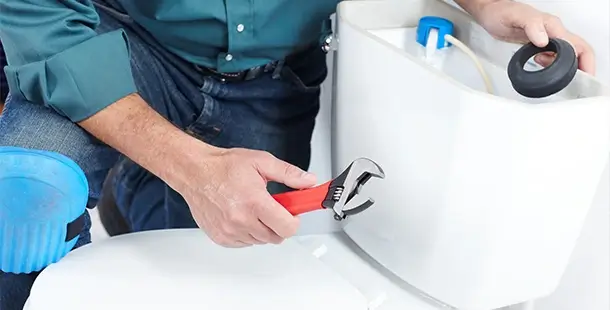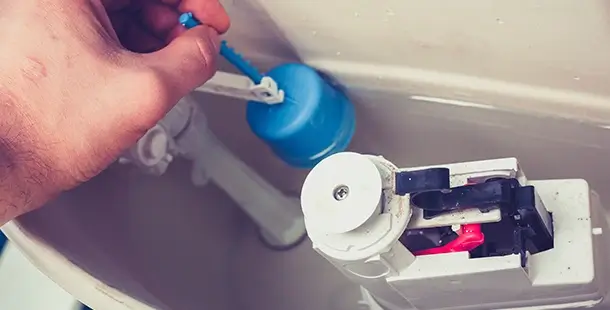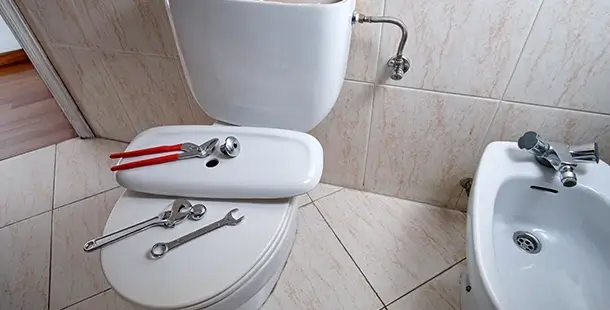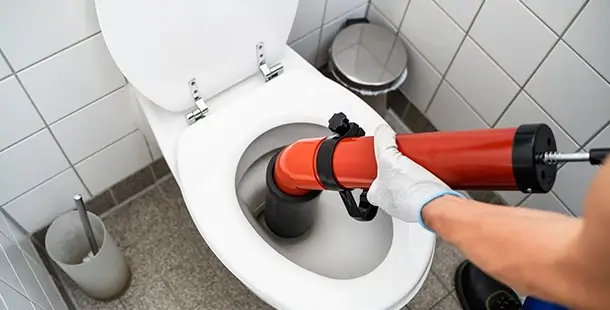Toilet Repair, Replacement & Installation
Most homeowners can manage basic toilet repairs, like adjusting the float valve. More complicated issues, like a cracked bowl or leaks, should be left to a professional.
In some cases, replacing an old toilet with a new one is your best option. New toilets use much less water than older models; some offer creature comforts like heated seats.
If you’re unsure whether to repair or replace your toilet, let us help you decide.

Easy DIY Toilet Repairs
You may be able to troubleshoot and fix the following problems on your own:
- A loose handle
- A fill valve that needs adjusting
- A flush valve that needs replacing
- A running toilet (a faulty flapper usually causes this)
Toilet Repair: When You Need a Professional
DIY jobs become a risk with more challenging problems. Something like an improper seal can cause significant problems.
Call us to troubleshoot and repair:
- Leaky toilets
- Badly clogged toilets
- Toilets that rock or wobble
- Cracked bowls or tanks
- Corroded pipes
- Low-flush toilets that don’t work properly
A toilet installed before 1994 could use as much as 6 gallons per flush (GPF). Newer toilets use 1.6 GPF or less, saving you a lot of money on your water bill each year.

When to Replace Your Toilet
You may need to replace your toilet if:
- It clogs or overflows frequently
- The bowl or tank is cracked
- It wobbles or rocks
- It leaks persistently
- It doesn’t flush properly
- It flushes by itself
- It’s too low to the ground
- You’d like a more comfortable height
- It uses a lot of water per flush (GPF)
- It’s more than 20 years old
New Toilet Installation
Our certified plumbers will detail your options, install the best model for your budget and bathroom, and haul away your old toilet for disposal.
Popular types of modern toilets
- Low-flush toilets use less water per flush, saving you money on your water bill.
- High-efficiency toilets are designed to reduce water use without sacrificing performance.
- Dual flush toilets have two buttons or levers that allow you to choose between a partial and full flush. This can save even more water than a low-flush toilet.
- Comfort-height toilets are taller than standard toilets, making them more comfortable for taller users.
- Compact toilets are smaller than standard toilets. They’re a good option if you have limited space.
- Heated toilets have a heating element in the seat for warmth on chilly days. You’ll never leave the bathroom!
- Bidet toilets have a built-in bidet, or washing wand, to clean the nether region.

Toilet Clogs & Overflows
Frequent clogging may be symptomatic of bigger issues, like a blocked or damaged sewer line or trouble with the main sewer line.
Call us if you experience frequent toilet clogs or overflows. We’ll identify potential problems and fix them quickly so you can return lickety-split to your heated seat.
Preventative Toilet Maintenance
The best way to avoid toilet repair is to practice preventative maintenance. Some simple tips include:
- Don’t flush anything other than human waste and toilet paper.
- Have your sewer line cleaned every two years to prevent blockages.
- If you notice any leaks, have them repaired as soon as possible.
- If you have a slow-draining toilet, don’t use it until the problem is fixed.
Even with proper maintenance, all toilets will need to be repaired or replaced at some point. When that time comes, call us, and we’ll help you figure out the best solution for your home.

What to Expect From Us
When you ask us to look at your garbage disposal, here’s what you can expect:
- A live person will answer your call 24/7 and schedule a service appointment that’s convenient for you.
- A uniformed, professional technician will arrive on time, fully equipped to do the job.
- The technician will diagnose the problem and explain your options.
- If you decide to replace the disposal unit, the technician will help you choose the right model for your needs and ensure the unit is compatible with your plumbing and electrical systems.
- Once the job is complete, the technician will clean up the mess, answer any questions, and haul your old disposal to the recycling center.
- We’ll charge a fair, upfront price. And we won’t add hidden fees.
Our goal is to leave you completely satisfied with our work. Call us today to schedule service!
Frequently Asked Questions about Toilet Repair
How much does it cost to replace a toilet?
The cost of replacing a toilet varies depending on the type of toilet you choose and whether you need professional installation.
How often should I replace my toilet?
Most toilets will last for 20-30 years. If your toilet is leaking, running, or otherwise not working correctly, it may be time for a replacement.
Can I install a new toilet myself?
We recommend hiring a professional for all new toilet installations to ensure the job is done to code.
Do I need a permit to replace my toilet?
You may need a permit for your new installation, depending on your municipality’s requirements. Our certified plumbers will let you know if you need a permit and obtain one on your behalf if necessary.
What type of toilet should I buy?
The type of toilet you choose will depend on your needs and preferences. Some things to consider include flushing performance, water use, and comfort.
How much does it cost to repair a toilet?
The cost of repairing a toilet varies depending on the problem. Some repairs, like fixing a loose handle, are relatively inexpensive. More serious issues, like a cracked bowl, require replacement and cost more.
What are the most common toilet problems?
Common toilet problems include leaking, constant running, clogs, and overflows. These problems can often be corrected with a simple repair.
What should I do if my toilet is leaking?
Call a plumber as soon as possible to have it repaired. Leaks can cause serious damage to your bathroom floor.
What should I do if my toilet is constantly running?
Check to see if the float is set correctly. If it is, then you may need a new fill valve. Call a plumber to have it repaired or replaced.
My toilet is clogged. What should I do?
Try using a plunger to clear the clog. If that doesn’t work, call a plumber to clear the blockage.
What should I do if my toilet overflows, even when there's no paper in the bowl?
Turn off the water supply and call a plumber right away to prevent damage to your home.
For more information or to schedule an appointment, please call us today.
